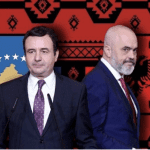By EBI SPAHIU*
The events in Paris last week, where a French satirical newspaper was attacked for mocking Prophet Mohammed in an earlier published edition, spurred a new wave of debates dominating social media and discussions among opinion-makers on the rise of religious extremism in Europe. A key question keeps arising as the debates circle around the appropriate ways to respond to a growing phenomenon, the limitations of free speech, the double standards of world leaders and the threats these types of attacks pose to Muslims and Christians alike. But how much of a burden should the world’s Muslim community carry following these attacks?
A large number of analyses and op-eds featured in local and international newspapers have been analyzing the religious values promoted in Islam and the social phenomenon that is encouraging the behavior of fighters that pledge allegiance to either the Islamic State or Al-Qaeda in carrying out these types of violent acts. In Albania, government officials were quick to show their solidarity with the French government as well as encouraged Albania’s clergy from the Muslim, Catholic, Orthodox and Bektashi communities to march the streets of Paris hand-in-hand and show a rare example of unity that characterizes religious harmony in Albania.
However, we are forgetting to talk about the main ideology behind these political and military movements that speak in the name of Islam. Most of the current religious militants pledging allegiance to extremist groups such as ISIS, Al-Qaeda, Al-Nusra, Boko Haram or Al-Shabab (some of these groups are often enemies in the front lines of war) are inspired by one single unifying and highly-funded ideology which has infiltrated large numbers of madrassas and mosques from Eritrea to Uzbekistan, including several religious institutions in the Balkans. Wahabbism or salafism is an ideology of Saudi Arabia, which at the core is the notion of “takfir,” coming from the Arabic root word of “kafir”, defined as the act of labeling another person an infidel and therefore legitimizing their murder. Many countries faced with growing threats of extremism in recent years have sought to restrict the funding of mosques and madrassas that teach salafism so as to prevent “takfirism” from gaining a hold. But Wahabbism has taken an unprecedented toll in the past 20 years, with over 100 billion dollars being funded into these religious teachings throughout the world.
Some Albanian religious leaders attribute the growing numbers of militant Islamists to the ways moderate Islam has been hijacked via the funding and the religious capacities of salafists. “The Albanian Muslim Community does not have sufficient theological capacity when faced with stronger preachers who offer a different interpretation of Islam in mosques that are not always approved by the authority of the Muslim Community of Albania,” says Ermir Gjinishi, a religious leader based in Tirana, during an earlier interview.
Around the world, Muslims, more than any other group, are the true victims of this ideological trend. According to statistics, more Muslims have been victims of terrorist attacks than any other group in recent years. In Nigeria, Boko Haram is to be credited for over 10, 000 killings in northern regions where Muslim populations dominate. According to initial reports, now Boko Haram controls an area equivalent to the size of Switzerland in northern Nigeria which is increasingly abandoned by the Christian south. The government of Nigeria has been slow in responding to these attacks and seems to be weak in front of a highly funded military group that has long infiltrated the ranks of the Nigerian army. Parallel to the attacks in Paris last week, Boko Haram is reported to have killed over 2000 people, in addition to several other attacks throughout the north in recent months. This is just one example that demonstrates that the current political power religious extremist groups have gained, is not a clash of civilizations between the West and the Orientalists. Instead, it is rather a clash of religious ideologies within Islam.
In the meantime, the reactions of jihadi followers and groups from Dagestan to Libya have praised the acts of the two brothers killed at the hands of the police 24 hours after the Charlie Hebdo attack. Since then, alleged ISIS supporters have also been able to hack the Central Command Twitter and Youtube accounts, showing a an uncanny technological strength at their disposal, in addition to a sophisticated media outlet which has been able to recruit thousands of foreign fighters since the emergence of ISIS in June of 2014. Now more than ever, lone wolf attacks seem to be promoted and encouraged among followers. Al-Qaeda and ISIS have both praised the attacks in Paris. For analysts studying the moves of extremists organizations, this last event poses several questions regarding the coordination between terrorist organizations that are also at war with each other, including Al-Qaeda and ISIS. However, this might present even a further issue: that of inspiring solidarity and unity among terrorist organizations.
Religious extremism is not unique to Islam and to this day there is no empirical evidence to suggest that Islam inherently encourages violence. Throughout history religions have been instrumental to justify acts of violence, including the Apartheid in South Africa, slavery in the Americas, the crusades, WWII, terrorist acts of the IRA in Northern Ireland, to name a few, which were all justified in the name of Christianity. At the moment there are hundreds of foreign fighters that have joined the war in Ukraine in response of the Russian Orthodox church’s call to support Russian speaking rebels. But the difference is that they are far less organized and far less funded than religious extremists of Wahabbi ideology. With the current state of affairs, our main concern should not be of how we look at Islam, but rather think of how we can bring to the religious rhetoric the true values of Islam that once dominated the majority of mosques around the world.
In Albania, on several occasions the Albanian Muslim Community has distanced itself from the “illegal” mosques that are believed to be the hubs of recruiting young men and women to fight abroad. Muslims today need to ask themselves whether that is the right approach rather than getting ahold of a small minority that has lost their faith in the religious institutions that have historically protected and promoted religious harmony.
Ebi Spahiu is a Tirana Times contributor and an analyst on countering violent extremism focusing on gender issues, Central Asia and the Western Balkans.










